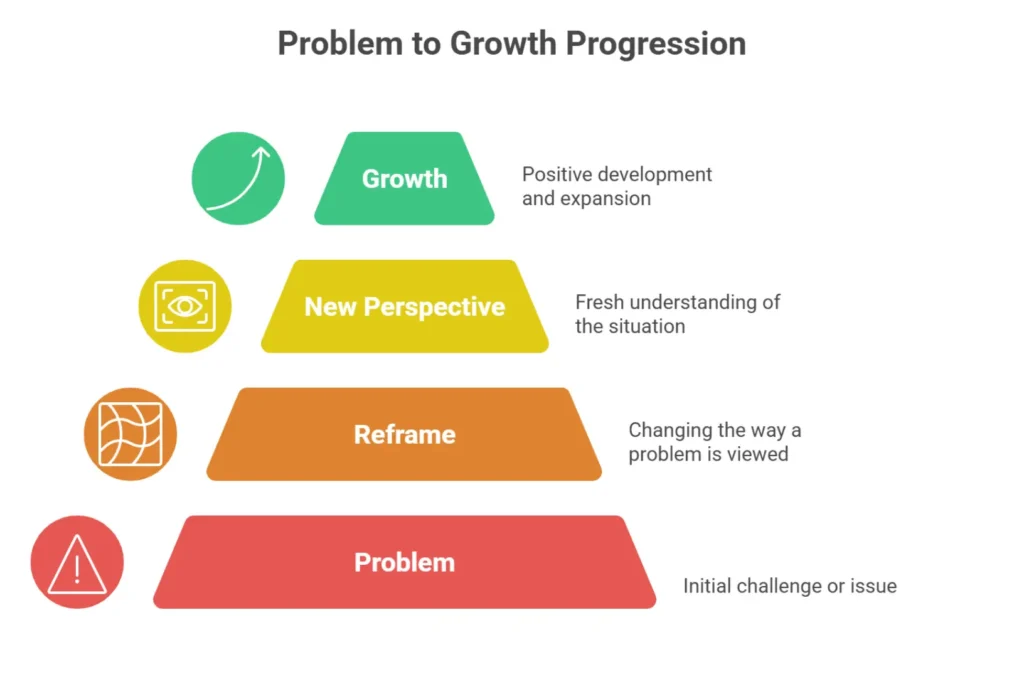Applying NLP (Neuro-Linguistic Programming) techniques in corporate leadership coaching empowers leaders to master communication, emotional intelligence, and behavioral flexibility. Through strategies like anchoring, reframing, rapport building, and modeling, leaders can inspire teams, make smarter decisions, and create lasting impact.
Key Takeaway:
- NLP isn’t fluffy theory—it’s your secret weapon for corporate leaders to decode behaviors, build unbreakable rapport, and turn obstacles into fuel, creating self-aware influencers who lead with empathy and precision in high-stakes environments.[1]
- Master 5 core techniques: Rapport building (mirror tone/body language for instant trust), reframing (flip failures into “fast-forward to success”), anchoring (trigger peak confidence with a breath or gesture), meta-model questions (cut through vagueness like “What exactly do you mean?”), and modeling excellence (copy top performers’ calm under fire).[1]
- Ditch traditional coaching’s checklists—NLP drives deep mindset rewires for emotional mastery, adaptive communication, and authentic presence, slashing stress, boosting decisions, and skyrocketing team morale without the tactical burnout.[2]
- Integrate it now: Get NLP-certified, blend with EQ tools, run roleplays for real conflicts, track wins via 360° feedback—start with one technique in your next session to unlock transformational shifts in weeks.[2]
Bottom Line: Elevate your corporate coaching from good to game-changing—harness NLP to forge resilient, empathetic leaders who don’t just manage teams, but inspire unbreakable loyalty and exponential growth.
- Source: Unleash Your Power – How Do I Apply NLP Techniques in Corporate Leadership Coaching? (introduction, why NLP matters & techniques sections)
- Source: NLP vs traditional, integration strategies, benefits & FAQ sections
Leadership in today’s corporate world is no longer just about authority; it’s about influence, empathy, and adaptability. Organizations are realizing that the most effective leaders are those who can understand human behavior and communicate with precision.
That’s where Neuro-Linguistic Programming (NLP) comes in. NLP offers practical methods to decode how people think and respond, helping leaders transform challenges into opportunities. When integrated into leadership coaching, NLP becomes a catalyst for behavioral change, stronger communication, and authentic leadership presence.
Let’s explore how NLP techniques can elevate corporate leadership coaching and reshape the way professionals lead and connect.
Why NLP Matters in Corporate Leadership Coaching

Modern organizations demand more than technical competence; they require self-aware, emotionally intelligent, and people-centered leaders. NLP equips these leaders with the tools to:
- Decode human behavior
- Communicate with influence
- Adapt leadership styles to diverse personalities
- Lead with empathy and strategic precision
As companies move toward adaptive and agile leadership, NLP in corporate coaching bridges the gap between knowing what to do and doing it effectively.
The Role of NLP in Transformational Leadership

NLP helps leaders understand the unconscious patterns that drive behavior both in themselves and in their teams. Once these patterns are recognized, they can be reshaped for greater success.
For example:
- A leader who fears delegation can reframe that belief to trust in empowerment.
- A team that resists change can be guided to see new possibilities through reframed communication and anchoring positivity to innovation.
In essence, NLP transforms communication into influence and intention into impact.
Applying NLP Techniques in Corporate Leadership Coaching
Rapport Building: The Cornerstone of Leadership Influence
Every successful coaching relationship begins with rapport. NLP helps leaders create instant connection and trust by matching body language, tone, and language patterns.
When rapport is established, communication flows naturally, reducing friction and improving collaboration.
Practical Tip:
In leadership meetings, observe the team’s tone and pace, then subtly align your own. This unconscious harmony fosters trust and open dialogue.
Result:
Teams feel heard, leaders gain influence, and workplace communication becomes effortless.
Reframing Turning Problems into Possibilities
NLP reframing helps leaders shift perceptions. Instead of viewing obstacles as setbacks, they begin to see them as opportunities for growth.

Example:
If a project fails, instead of saying “We didn’t meet expectations,” reframe it to “We discovered what doesn’t work and now we know how to succeed faster next time.”
Coaching Application:
Coaches can guide leaders to challenge limiting beliefs by reframing internal dialogue, leading to resilient and empowered thinking.
Anchoring Accessing Peak States Instantly
Anchoring allows leaders to recall confidence, calmness, or focus on command. By pairing a specific gesture, phrase, or breath with a desired state, leaders can regulate emotions even under pressure.
Example:
Before entering a negotiation, a leader can take a deep, deliberate breath (their anchor) that instantly triggers confidence.
Corporate Impact:
Anchored leaders are composed, persuasive, and emotionally stable, essential for navigating high-stakes decisions.
Meta Model Questioning Sharpening Communication Clarity
Many leadership misunderstandings occur because of vague or generalized communication. NLP’s Meta Model questioning helps leaders ask precise questions that uncover real issues behind the words.
Example Questions:
- “What specifically makes you think the team isn’t aligned?”
- “Who says this can’t be done and based on what evidence?”
This leads to deeper insights, accountability, and clarity in communication.
Modeling Excellence: Replicating Successful Leadership Patterns
One of the most powerful NLP applications in corporate coaching is modeling top performers. Coaches help leaders identify the specific mindset, language, and behavior patterns of successful individuals and integrate them into their own leadership style.
Example:
A leader might model how a top-performing executive handles conflict, adopting their calm tone, reframing approach, and questioning strategy.
Result: The leader quickly evolves without years of trial and error.
NLP vs Traditional Leadership Coaching
| Aspect | NLP-Based Leadership Coaching | Traditional Leadership Coaching |
| Focus | Mindset, language patterns and emotional intelligence | Skill development, strategic planning |
| Approach | Deep behavioral transformation | Goal-driven feedback and accountability |
| Tools | Anchoring, reframing, meta-model questioning and modeling | SWOT analysis, performance metrics |
| Outcome | Lasting mindset shift, improved communication and self-awareness | Tactical improvements, management efficiency |
| Impact Level | Personal + organizational transformation | Primarily organizational performance |
How to Integrate NLP into Your Leadership Coaching Program
- Get Certified in NLP Leadership Coaching
Gain a strong foundation by enrolling in an Advanced NLP Leadership Training and Certification program. - Blend NLP with Emotional Intelligence Frameworks
Combine NLP tools with EQ models to enhance empathy, rapport, and team synergy. - Use NLP-Based Coaching Tools
Apply anchoring, reframing, and sensory acuity exercises during sessions for maximum impact. - Incorporate Real-World Roleplays
Simulate workplace challenges, conflict resolution, public speaking, feedback sessions and practice NLP interventions live. - Track Leadership Transformation
Measure progress through 360° feedback, behavior assessments, and post-coaching reflections.
This is the power of applied NLP in executive leadership’s inner transformation that drives outer success.
Benefits of NLP in Corporate Leadership Coaching
- Enhanced self-awareness and emotional control
- Stronger communication and persuasive influence
- Improved decision-making and adaptability
- Authentic, empathetic leadership presence
- Reduced stress and burnout through emotional regulation
- Measurable improvement in team morale and performance

Final Thoughts
Incorporating NLP techniques into corporate leadership coaching is more than a professional skill; it’s a transformational mindset shift.
When leaders master NLP, they don’t just learn to communicate better; they learn to understand themselves and others on a deeper level. They inspire with empathy, lead with authenticity, and create lasting influence that goes beyond strategy and into human connection.
If you’re serious about developing transformational leadership skills, now is the time to integrate NLP into your coaching practice or organization.
FAQs
How does NLP improve corporate leadership?
NLP enhances leaders’ communication, emotional intelligence, and problem-solving abilities by changing unproductive thought patterns and fostering powerful leadership behaviors.
What are the most effective NLP techniques for leadership coaching?
Key techniques include rapport building, reframing, anchoring, meta-model questioning, and modeling excellence.
Can NLP help in managing workplace stress?
Yes. NLP teaches emotional regulation and anchoring techniques that help leaders stay calm, focused, and productive under pressure.
Is NLP suitable for executive or C-suite leaders?
Absolutely. NLP is highly effective for executives who want to lead with empathy, influence at scale, and create a culture of trust and innovation.





